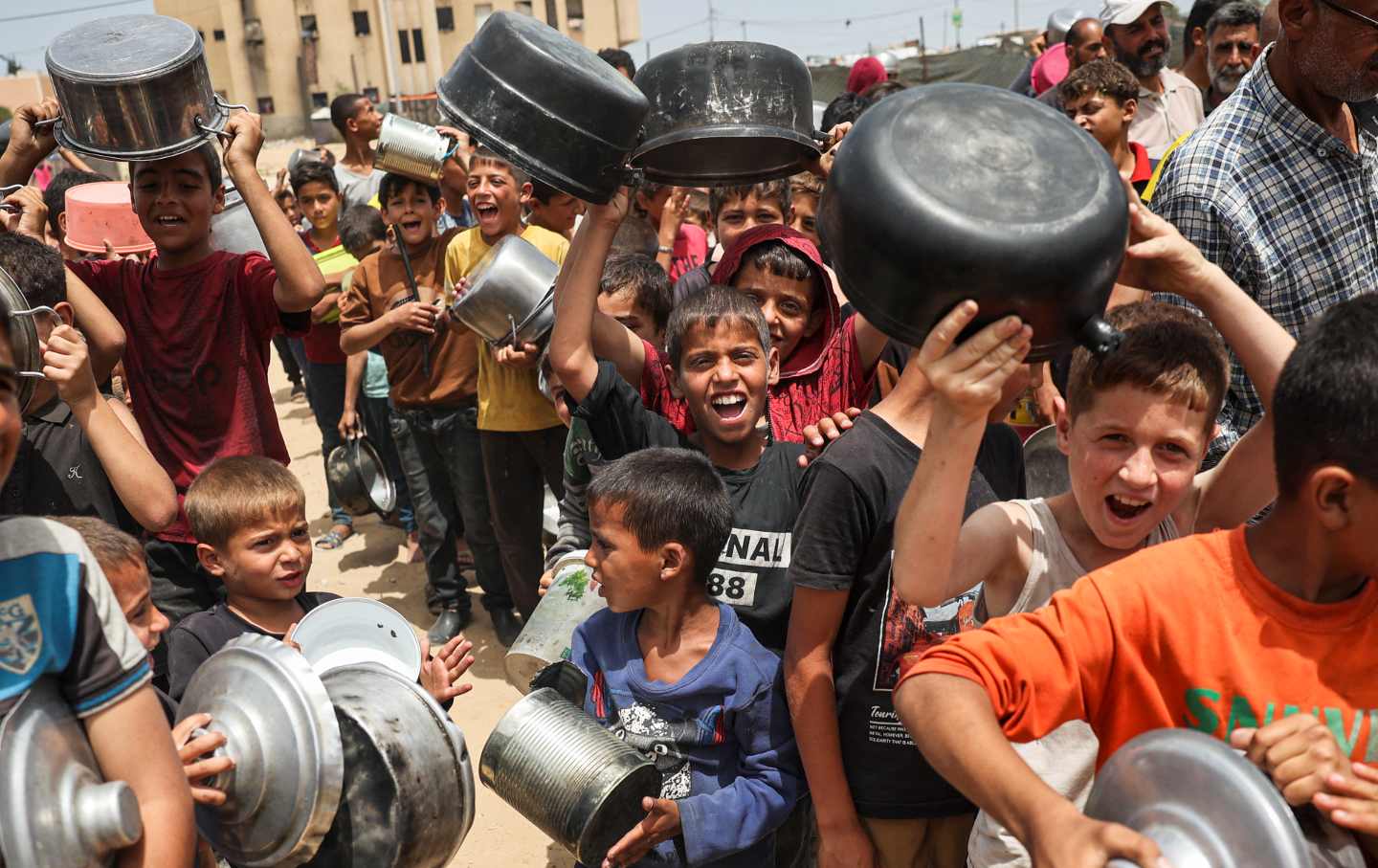Gazans Don’t Need Biden’s PR Stunts. We Need Him to End This Horror.
Floating piers won’t change anything. The world needs to pull Israel back before there is no Gaza left at all.

Displaced Palestinian children line up to receive food in Rafah, on the southern Gaza Strip, on May 19, 2024.
(AFP via Getty Images)More than 800,000 Palestinians were forced to flee Rafah, at the southernmost tip of the Gaza Strip, in the last two weeks, myself included. Israeli aircraft dropped leaflets urging us to leave, first in the eastern part of the city, then days later, in neighborhoods and encampments deep within Rafah, just ahead of the tanks rolling in. Most of these people had already fled the Israeli machinery of death and destruction multiple times in the past seven months. They had poured into Rafah after similar leaflets were dropped on them in Gaza City, or the Jabaliya refugee camp, or one of the countless other places in Gaza where Israel has made it nearly impossible to survive.
Being in Rafah never meant safety, even before Israel’s current ground invasion. On October 24, my family’s home in the city was struck by an Israeli missile. Israel targeted us because of my work as an activist and my visible role in mobilizing the Great March of Return in 2018. The missile killed six members of my family, including my 13-year-old son, Abdullah. I was so consumed by agony that I could scarcely feel the pain of the second-degree burns covering my own body.
Then, in March, Israeli forces blew up my apartment in Khan Younis. I found myself homeless, like more than a million and a half Palestinians in Gaza, who are displaced from one roadside to another, seeking a place to sleep.
I am now back in Khan Younis, though still without a home. The city is completely destroyed. I see displaced families fleeing anew, wandering with uncertainty, as there’s no safe place in Gaza from Israel’s campaign of genocide. Most have no source of income, since the economy has completely collapsed, and fuel prices are exorbitant because of Israel’s blockade and closure of crossings, so transportation costs have doubled. People resort to primitive means like animal-drawn carts to move to a new site of displacement. Many can’t even pay this cost.
No matter where I go, I see the rubble of houses destroyed by Israeli bombardment. Tents have become a scarce luxury in this cruel war; thousands of families have created makeshift shelters on the sidewalks or street corners with nothing but scraps of worn-out fabric. All services have collapsed; garbage is piled up and streams of sewage are everywhere, foreshadowing environmental disasters and outbreaks of deadly epidemics. People spend hours waiting in endless lines: for potable water, for water to wash with, to use a public bathroom, to buy food, to receive money from one of the few still-functioning banks–when cash is available at all. Every face I see bears evidence of sadness, despair, and confusion. The most frequently asked question: When will this nightmare end?
A recent visit to Al-Aqsa Martyrs Hospital in Deir Al Balah made me painfully aware of the extent to which Gaza’s entire healthcare system has been decimated by Israel’s systematic attacks. It is one of the last hospitals in Gaza still in service and is operating far beyond its capacity.
There were hundreds of displaced families in the hospital courtyard and corridors. I saw new casualties arrive every hour, accompanied by the cries of women mourning their children, husbands, or brothers. In every direction, I saw bodies piling up, waiting to be taken to the cemetery. It’s terrifying to get so accustomed to scenes of death.
Seventy men arrived at the hospital on Sunday, whom the Israeli military had taken captive and then dumped back in Gaza. I saw a number of them myself. They were pale, gaunt, and bore signs of brutal torture. People rushed to them, eagerly seeking news about their missing loved ones who are assumed to have also been abducted by the Israeli army. They seemed to lack the psychological energy to answer the torrent of questions. Most of them didn’t have a home to which they could return to recuperate.
When I can get a bar of reception, I frantically catch up on the news and what the world is saying about our suffering. American officials caution Israel about its invasion of Rafah, symbolically delaying one shipment of arms to Israel’s military while advancing another billion dollars worth of weapons at the same time, and warn about the need for humanitarian aid to enter Gaza; they even drop boxes of ready-made meals. Yet how can we believe that President Biden is serious about supporting us, while US military, economic, and political support continues to enable the war crimes Israel is committing?
In addition to dropping meals, hundreds of thousands of American-made bombs and shells have been dropped on us, including the missile that killed my son Abdullah. This is why I became a plaintiff in a lawsuit filed in US federal court against the Biden administration, suing them for their complicity in Israel’s genocide. The judge found that this was, indeed, a plausible case of genocide. And yet, war crimes funded by the US continue, unabated.
We don’t need empty words of concern or cynical PR stunts like air drops or floating piers. We need the international community–and the Biden administration in particular–to impose a cease-fire on Israel and to stop the invasion of Rafah and the destruction of Gaza. We need the world to take a stand against the policies of collective punishment on civilians, through repeated displacement, endless massacres, widespread destruction, and denying people access to food and other basic necessities of life.
A few decades ago, the world became convinced that it was unacceptable for the apartheid regime in South Africa to continue, that such a system was contrary to global moral values, and took concrete action to demand that apartheid end. We need the same global moral clarity and action today when it comes to Israel’s genocidal campaign in Gaza and its apartheid system, which is the root cause of all the violence in the region.
I try to imagine what a future governed by values of justice and human rights might look like. But unless the world acts now to stop the destruction and displacement against an entire people, my city, and Gaza itself, may be no more.
More from The Nation

What Comes After the Apocalypse? A Q&A With Joshua Oppenheimer What Comes After the Apocalypse? A Q&A With Joshua Oppenheimer
Oppenheimer’s latest film, The End, is a Golden Age, postapocalyptic musical crying out from the depths of the earth.

What Luigi Mangione and Daniel Penny Are Telling Us About America What Luigi Mangione and Daniel Penny Are Telling Us About America
When social structures corrode, as they are doing now, they trigger desperate deeds like Mangione’s, and rightist vigilantes like Penny.

Donald Trump Is the Authentic American Berserk Donald Trump Is the Authentic American Berserk
Far from being an alien interloper, the incoming president draws from homegrown authoritarianism.

Banning Trans Health Care Puts Young People at Risk of Harm Banning Trans Health Care Puts Young People at Risk of Harm
Contrary to what conservative lawmakers argue, the Supreme Court will increase risks by upholding state bans on gender-affirming care.




